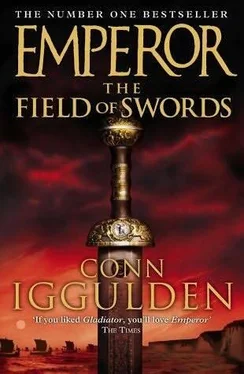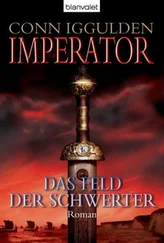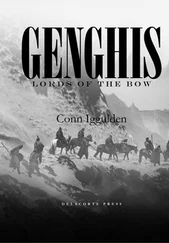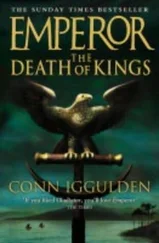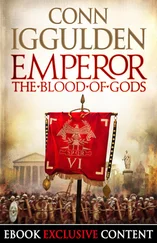“Senators, tribunes,” Suetonius began, “I am no friend to Caesar, as many of you know.” He allowed himself a small smile at the chuckle from the benches. “We have all heard of his victory against the Helvetii in Gaul, a most worthy battle that had the citizens cheering in the markets. Yet the matter of his debts is not a minor concern. I have the estimate here.”
Suetonius made a show of checking a paper, though he knew the figures by heart.
“To Herminius, he owes just under a million sesterces. The other lenders together, another million, two hundred thousand. These are not small sums, gentlemen. Without these funds, the men who advanced them in good faith may well be forced into poverty. They have the right to appeal to us when Caesar shows no sign or inclination to return to the city. The law of Twelve Tables is quite clear on the matter of debt, and we should not support a general who scorns the statutes in this way. I urge the Senate to demand his return to clear his slate with the city. Failing that, perhaps an assurance from Pompey that the term in Gaul has some clear end, so that those who struggle in the wake of these debts can look forward to settlement on an agreed date. I will vote in favor of recalling Caesar.”
He sat down and Pompey was about to motion to the next speaker when he saw the new tribune had risen.
“Have you anything to add, Polonus?” Pompey said, smiling at the man.
“Only that this seems a small stick with which to beat a successful general,” Polonus replied. “As I understand the matter, these debts are personal to Caesar, despite his use of them to supply and outfit his soldiers. When he returns to the city, his creditors can lay hands on him for the sums, and if he cannot pay, the penalties are harsh. Until then, I do not see a role for the Senate in demanding his return into the hands of coarse moneylenders.”
A murmur of approval sounded from the senators and Pompey stifled a smile. Large numbers of them had debts, and Suetonius would have to be a genius to make them call back a general to satisfy the grubby urging of men like Herminius. Pompey was pleased Polonus had spoken against the vote. Perhaps he was not in Clodius’s pay after all. Pompey caught the tribune’s eye and inclined his head as the next speaker rose, barely listening to the speech by some minor son of the nobilitas.
Pompey knew there were many who described his dismissal and restoration of the tribunes as a masterful stroke. The older members especially looked to him for leadership and strength to face the new players of the game. Many of them had come to him in private, but in the Senate their fear made them weak. There were not many who dared to risk the enmity of one like Clodius. Even for Pompey, the thought of Clodius becoming consul one day was enough to make sweat break out on his skin.
As the young senator droned through his speech, Pompey’s gaze drifted to another of the new men,
Titus Milo. Like Clodius before him, he had come to the Senate when his merchant ventures were lost.
Perhaps because of that shared background, the pair appeared to dislike each other intensely. Milo was red-faced from drink and fat where Clodius was solid. Both men could be as coarse as the worst gutter whore. Pompey wondered privately if they could be set at each other’s throats. It would be a neat solution to the problem.
The vote was taken quickly and for once Pompey’s supporters did not waver. Clodius had not spoken and Pompey knew it was likely he had indulged Suetonius without pledging his full support. There would be no sudden reports of gangs rampaging through the markets that night. Clodius caught Pompey’s thoughtful gaze on him and nodded his massive head as one equal to another. Pompey returned the gesture out of habit, though his mind seethed with some of the ugliest rumors. It was said that Clodius employed bodyguards who used rape as a casual tool of persuasion when they were on his business. It was just another of the tales circulating like flies about the man. Pompey gritted his teeth as he saw the secret gleam of amusement in Clodius’s eyes. In that moment, he envied Julius in Gaul. For all the hardships of a campaign, his battles would be simpler and cleaner than those Pompey faced.
Brutus roared angry orders out to the Tenth as they trotted their Gaulish ponies toward the distant mass of horsemen at the foot of the crag of rock called the Hand. While he understood Julius’s desire to have the veterans of the Tenth with him, they rode like wayward children. Above a walking pace, horses drifted into each other, and on anything but the smoothest ground, the red-faced soldiers were thrown off, suffering the humiliation of being forced to run alongside until they could heave themselves back into the saddles.
As if that wasn’t enough, Brutus seethed inwardly at Mark Antony being given control of the legions waiting behind them. He could accept the fact that Julius wanted Brutus and Octavian with him to control the extraordinarii, but Mark Antony had not earned the right to be Julius’s second-in-command. Brutus was in a savage temper as he wheeled his mount to respond to a commotion behind him.
“Gather up your reins, by Mars, or I will have you whipped!” he shouted to an unfortunate, milling group of triarii. In their heavy armor, they sat their horses like clanking sacks of corn, and Brutus rolled his eyes as another leaned too far forward and slipped from sight under his pony’s legs with a crash.
It was no way to approach a possible battle. The Tenth were used to the rhythms of foot soldiers, and the sweating, swearing men around him had nothing of the calm he was used to.
Octavian cantered past him, using his powerful gelding to force a wobbling rank of ponies back into line. The two men exchanged glances as they passed, and Octavian grinned, clearly amused by the situation. Brutus gave no answering smile, instead cursing the Tenth under his breath as two horses somehow became joined together ahead of him, their riders heaving at the reins until the tortured ponies panicked and bolted. Brutus caught them with a quick dart, holding on until the legionaries had regained control. They could not be expected to have the casual balance of thousands of hours of training, and he only hoped Julius would have the sense to call a halt long before Ariovistus could see their lack of skill. For men born in the saddle, there could be no deception.
Before they had set off, Julius had come to him. He had seen Brutus’s coldness and spoke to reassure him.
“I must have you with me, Brutus,” he had said. “The extraordinarii are the only competent riders I have and they are used to your orders.”
Julius had stood close to him then, unwilling to be overheard.
“And if I am forced to fight, I do not want Mark Antony at my side. He thinks too much of this Ariovistus and his friendship with Rome.”
Brutus had nodded, though the words did not go far to appease his sense of betrayal. The post was owed.
The outriders saw the Hand and reported back before noon. As the Tenth neared the crag, Brutus could see thousands of horsemen in perfect ranks ahead. They had chosen a place for the meeting where cavalry were hampered by steep defiles on either side. The rock they called the Hand formed the highest point to the east, with the western side choked with dense forest. Brutus wondered if Ariovistus had men hidden in the dark oaks. He knew he would have placed them there and hoped the legions were not heading into a trap. One thing was certain, if it came to a retreat against those German riders, the Tenth would have to accomplish it on foot or be destroyed.
The cornicens sounded a dismount, a signal of two tones they had agreed on before leaving the camp.
Читать дальше
Конец ознакомительного отрывка
Купить книгу
